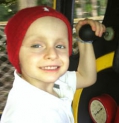Live-Cell Surface Proteomic Characterization of Atypical Teratoid Rhabdoid Tumors Using High Throughout Multi-Color Flow

Collaborators
Olivier Ayrault, PhD, Institut Curie
Rajeev Vibhakar, MD/PhD, University of Colorado Denver
Project Summary: Atypical teratoid rhabdoid tumor (AT/RT) is a rare and fast-growing childhood tumor of the brain and spinal cord. While recent advances in DNA and RNA sequencing have given deep insights into the biology of cancer, about 90% of AT/RTs harbor a single deletion which leads to uncontrolled tumor growth. The lack of targetable genetic abnormalities in AT/RT makes it a tough target for therapy and hence radical new approaches are required to develop treatment. Cell surface markers are proteins expressed on the surface of cells that often conveniently serve as markers of specific cell types. In many cases the gene expression profile alone does not represent the presence of the gene product on the surface and also the presence of any post-translational modifications such as the addition of sugars which are essential for the interaction of surface proteins with the tumor microenvironment. Furthermore, the surface proteins are responsible for the ability of cancer cells to avoid detection and elimination by the body’s immune system. The ability to escape from surveillance by the immune system is regarded as one of the essential hallmarks of cancer cells. Here we propose a comprehensive unbiased large-scale surface receptor profiling using high throughput multicolor flow cytometry on surgically resected AT/RT patient samples (12 available), primary AT/RT cell lines (8 available) and patient derived xenograft models (5 available). Flow cytometry not only enables the identification of surface markers on live cells but also for prospective enrichment of cells and can be utilized to study specific cell-surface interactions in intact cells.
Project Update 2020: With the help of ALSF, we set out on a project to map the surface landscape of a rare but extremely fatal pediatric brain tumor called Atypical Teratoid Rhabdoid Tumors which are classified as Grade IV tumors. An atypical teratoid rhabdoid tumor (ATRT) is a rare and fast-growing cancerous tumor of the brain and spinal cord. About half of these tumors begin in the cerebellum or brain stem. While extensive studies have been done in genomic characterization of these tumors, the presence of very few mutations in them has made it difficult to come up with targetted therapies. Hence we decided to take an alternate approach. The proteins on the surface of the cell are the first ones to interact with any drug or therapy. We used a technique called Flow Cytometry where the physical and biochemical characteristics of a population of cells or particles are measured by combining them with the unique properties of monoclonal antibodies. In this process, a sample containing cells is incubated with monoclonal antibodies which are labeled with a light activating label or fluorophore. suspended in a fluid and injected into the flow cytometer instrument. Using this technique we scanned the surface of human ATRT tumor samples using 386 monoclonal antibodies and were able to create a detailed map of the proteins that are expressed on the surface of every single cell in an ATRT tumor. Using samples collected at the Children's Hospital Colorado dissociated into single cells we scanned the cell surface of every single cell which included the tumor cells and the associated immune cells surrounding the tumor. This allowed us to identify a number of targets on the cell surface which were not previously identified. This has allowed us to develop personalized approaches like CAR-T cell therapy to target ATRT tumors. We further established interacting modules between the tumor cells and their surrounding microenvironment which can be targetted by using small molecule inhibitors and monoclonal antibodies.

